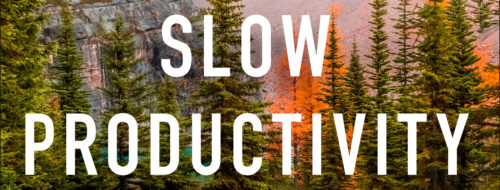Committing to deep work pays off, transforming how your colleagues perceive you and how you see yourself.
Part 3 of a 3-part series on the role deep work plays in fundraising. Read part 1 here, and part 2 here.
In a world of knowledge work that's defined by constant busyness, it's both difficult and valuable to pursue deep work. Deep work can enable you to become, like the title of one of Cal Newport's books, So Good They Can't Ignore You.
No one thinks that one day at the gym will transform them from couch potato to star athlete. Yet we seem to believe that emails, Slack messages, and meetings will make us all stars at work. It’s easy to believe that responsiveness is the key to success—after all, it's visible and immediate, and it provides instant gratification. We seem productive if we achieve inbox zero and are always available to answer questions from colleagues.
But responsiveness might provide only the illusion of productivity. The real question is, what do we mean by productivity? Is productivity getting the most tasks done, whether or not they’re in your job description? Or is it more productive to invest in accomplishments that will be remembered long after email threads have been deleted?
It's tempting to think that we can have both, but they're inherently conflicting. If we tell ourselves that we just have to finish shallow work before we can make time for deep work, deep work will always be pushed to a tomorrow that never comes.
If we can ignore that trap and focus on deep work, it quickly becomes its own reward. Our brains like tackling meaningful challenges and seeing progress—so the more we can make that progress visible, the better. Whether you're counting thank-you notes or tallying your deep work hours on a sticky note (as Newport does), keeping track of how far you've come is a powerful incentive to keep going, especially in long-term endeavors where progress seems slow day-to-day but compounds over weeks and months.
That type of compounding progress is extremely motivating. This is more obvious in other areas of life, such as the drive to achieve physical fitness or build personal relationships. But it can be true at work as well.
One of the biggest hurdles to overcome can be our mindset about what work "should" look like. Sure, everyone around you is exchanging emails at breakneck speed, and your workstation seems like a social hub. That might feel good in the moment, but it works against us in the long run.
If you're in fundraising at a college or university, chances are good that you have some beautiful architecture on campus. Cal Newport talks about "adventure studying" for students—go somewhere picturesque to study, and let the change of scenery inspire you. The same principle can and does apply to knowledge workers! Go find that special antique book room in the library or walk over to the music building. In this new space, you take on a different identity: you're a focused person who doesn't check email or go on social media (leave your phone back at your desk if necessary). Take your laptop or notebook, immerse yourself in your physical surroundings, and get to (deep) work.
If you're not at an educational institution, all is not lost. Your local public library, art museum, or hiking trail beckons. Once you've found your spot, make it a regular destination, teaching your brain that this location means it's time to focus. Even if you're stuck in one spot, you still can come up with a "deep work ritual," as outlined on Newport's podcast, Deep Questions. The important thing is to signal to your brain that now is the time to start deep work, whether your ritual involves listening to special music or drinking a particular type of coffee.
How long should these sessions last? They can be spread out throughout the workday, but Newport recommends the total not exceed four hours per day. Even 90 minutes a day of deep work can make a huge difference. Emails and Slack messages will still be there when you get back. You'll still have time to talk to people in person (which is often more efficient than back-and-forth emails anyway).
Admittedly, pursuing work like this can be challenging if you're the only one doing it in an office culture that worships the hyperactive hive mind.* So find your tribe, whether it’s comprised of colleagues or others in the community. (Librarians love seeing regular patrons!) With people you trust, you can open up about your metrics for measuring deep work and its outcomes, helping others understand and appreciate your methods’ positive results.
Over time, deep work pays off, and you begin to see yourself as a different type of person: someone who isn't afraid to do hard things and who is making a meaningful difference in the world. That type of success is visible to others, and more importantly, it's worth far more than anything offered by the hyperactive hive mind.
______________________________________________________________________________
*Hyperactive hive mind: if you're unfamiliar with this term, see Cal Newport's book A World Without Email or watch his video "Core Idea: The Case Against Email."






